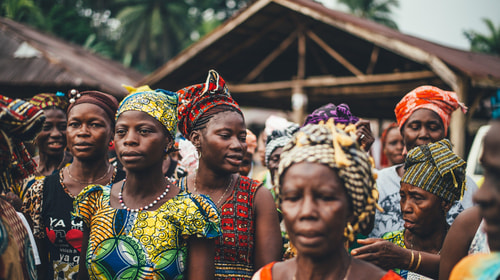When we think about the persecuted church, we likely think of stories of male church leaders who experience brutal attacks and killings, but there is a story that often goes untold… the story of persecuted Christian women and girls. Open Doors’ recent report highlights the hidden and long-lasting nature of persecution carried out against women and girls for whom following Jesus is just as costly as it is for men.
Recently, Open Doors published a parliamentary report exploring the impact that gender has on the persecution of Christians across the world. The report noted that Christian women and girls experience a greater breadth of persecution than their male counterparts because the persecution that they face is based on both their faith and their gender.
"While Christian men experience persecution that is typically visible, severe and focused, Christian women experience persecution that is hidden, violent and complex."
According to the report, there are three key areas that make the persecution of Christian women distinctive from the persecution faced by Christian men:
Hidden
The persecution of Christian men is usually very visible, often in the form of imprisonment and murder. This differs greatly to the experience of women, for whom persecution is much more hidden, with persecutors using culture norms to disguise the abuse and control that they carry out.
A particularly prominent form of hidden persecution is forced marriage. 88 per cent of the top 50 countries featured in Open Doors’ World Watch List 2022 (which provided reports on gender-specific persecution of women) cited this form of persecution as taking place in their country. In Central Asia in particular, “bride-knapping” is still a significant issue, where (often underaged) Christian girls are forced to marry a Muslim man. The legal system in many cultures favours the man, giving women no way of legally challenging the marriage.
Another form of hidden persecution highlighted in the report is house arrest. Individual women who have converted to Christianity but whose family remain Muslim are especially at risk of being put on house arrest by their family. The result is that they are denied access to church and support from other Christians.
Violent
Societal beliefs around purity and shame can make the form of persecution experienced by Christian women particularly violent and degrading. Incidents of sexual violence against Christian women and girls were reported in 90 per cent of countries that sit in the top 50 of Open Doors’ World Watch List 2022. In Asian countries, Christian women and girls are particularly vulnerable to being trafficked as brides. In sub-Saharan Africa, they are particularly vulnerable to being sexually enslaved by extremist groups.
Sexual violence is not only intended as a punishment for the women, but to bring wider shame on Christian families and communities. The trauma brought about by sexual violence can be long-lasting for the women that fall victim to it.
Complex
Women and girls are often targeted in the persecution of Christians because of their multi-faceted vulnerabilities – many are already discriminated against because of the inequality between genders. The reduced legal rights of women and girls in many countries where they experience religious persecution make it hard for women to escape persecution or seek justice.
In cultures where there are great inequalities between men and women, women are often reliant on male family members for support. In many cases, their male family members are experiencing persecution too, and some will have been killed, which can leave the women without male protection from their persecutors.
Male victims of persecution sometimes find a way to escape the country where they are experiencing persecution by seeking economic opportunities elsewhere. However, the same opportunities are not as accessible for women, who are often left behind in the country where they are being persecuted.
Open Doors’ research also found that crises disproportionally affect women experiencing persecution. For example, during the Covid-19 pandemic, women experienced a higher rate of physical, sexual and emotional abuse.
The experience of men and boys
While the report primarily focussed on the experience of women and girls, it did look at how men and boys are uniquely impacted by persecution based on their faith. According to the report, some of the ways men are impacted are:
- They are more likely to experience severe violence and even death for being a Christian.
- Since, in many of the cultures where persecution is rife, men are the financial providers, they are more likely to experience economic persecution through being denied work opportunities.
- As leaders of the family, male converts to Christianity often find themselves ostracised, sometimes even beaten or killed, by their own community.
- Men and boys may be recruited to join extremist groups’ militias.
What can we do?
The leaders’ summit on freedom of religion or belief that will take place in the UK this July is an excellent opportunity to engage your MP and other political representatives on issues of Christian persecution. Use the recommendations at the end of the Open Doors’ report (below) to help draft an email, asking policymakers to commit to change that will better protect women and girls at risk of persecution throughout the world.
Use the report to guide your individual and corporate prayer as you think about the challenges faced by Christian sisters and brothers in places where it is costly to follow Jesus.



